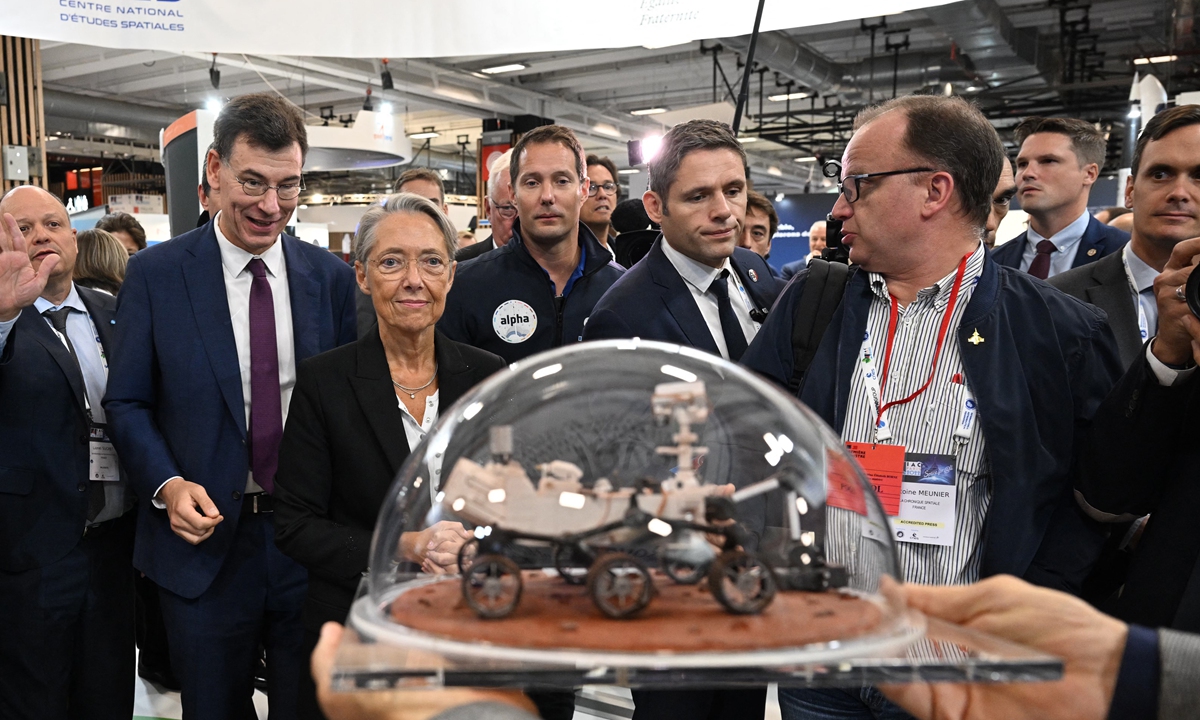
French Prime Minister Elisabeth Borne (third from left), flanked by Chairman of the National Center for Space Studies, scientist and researcher Philippe Baptiste (second from left) and French aerospace engineer, pilot, and European Space Agency astronaut Thomas Pesquet (center), looks at a model rover as she attends the 73rd International Astronautical Congress, held in Paris, on September 18, 2022. Photo: AFP
The European Space Agency (ESA) announced five new career astronauts as well as history's first astronaut recruit with a disability on Wednesday after adopting a record budget to fund its projects.The two female and three male career astronauts "will start working immediately," ESA Director-General Josef Aschbacher told a ministerial council meeting in Paris.
From more than 22,500 applicants, the agency chose France's Sophie Adenot, Spain's Pablo Alvarez Fernandez, Britain's Rosemary Coogan, Belgium's Raphael Liegeois and Switzerland's Marco Sieber.
"I'm European but from the UK," Coogan told the ceremony. Though Britain has left the European Union, it remains in the ESA.
The new recruits start training in 2023 and are not expected to blast off into space on a mission until 2026.
They will join the astronauts from the ESA's previous 2009 astronaut class, which include Britain's Timothy Peake and France's Thomas Pesquet. It is from that previous class that an astronaut will be selected to go to the moon as part of NASA's Artemis mission.
"No one is retiring today," Pesquet said in a statement, advising the new recruits to "hang on tight."
The ESA also announced the first astronaut recruit with a physical disability, British doctor and Paralympian John McFall, who will join a separate "parastronaut feasibility program."
The 41-year-old's right leg was amputated after a motorcycle accident at the age of 18. He became a sprinter, winning bronze at the 2008 Paralympics.
"It had been quite a whirlwind experience, given that as an amputee I'd never thought being an astronaut was a possibility," he said.
The ESA also established an astronaut reserve of six women and five men who passed the selection process and can be called up in future if needed.
The new astronauts were named after two days of tough talks by ministers from the ESA's 22 member states meeting in Paris to decide on the agency's future funding.
They settled on a budget of 16.9 billion euros ($17.5 billion) for the next three years, a 17 percent increase from the 14.5 billion euros agreed at the last ministerial council meeting in 2019.
But it was well short of the 18.5 billion requested by Aschbacher.
"With inflation being so high, I have to say that I'm very impressed by this figure," Aschbacher told the meeting.
French Economy Minister Bruno le Maire hailed a "great success" that was "beyond expectations."
Negotiations about each country's contribution continued until the last moment before the announcement.
The biggest contributors were Germany with 3.5 billion euros, France 3.25 billion euros and Italy 3.1 billion euros.
However, the total committed remains far below NASA's budget of $24 billion for 2022 alone.
AFP
